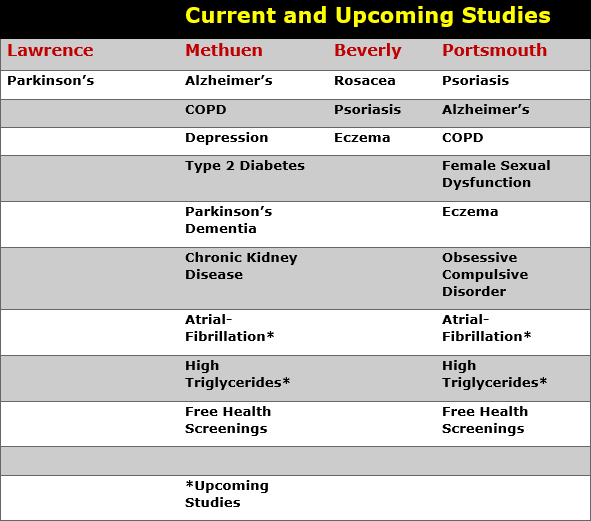
“Studying Tomorrow’s Treatments Today.”
Clinical Study Spotlight
Parkinson’s Disease
60,000 Americans Diagnosed each year
7-10 million people Worldwide have PD
Men are 1.5 times more likely to have Parkinson’s than women
Estimated costs around $25 billion per year in US
Why Join a Study?
Participating in a fundraising event is great, but it’s only part of the journey to finding a cure!
Volunteers are needed to help further investigate new treatments and better therapies.

Parkinson’s Disease
 (Stiffness, Shaking, and Tremors, and so much more)
(Stiffness, Shaking, and Tremors, and so much more)
Parkinson’s Disease is a neurodegenerative disorder characterized by the development of a resting tremor that typically presents in one part of the body but can become more global in nature with time. It frequently begins around ages 50-60, and is commonly associated with the loss of movement intellect and independence. Parkinson’s disease is usually diagnosed as being idiopathic (unknown cause), but we commonly find that many sufferers have a history of traumatic brain injuries. The symptoms may be brought about or made worse, by medications utilized to treat other illnesses as diverse as depression, dementia, psychosis, or even gastrointestinal disorders. The disorder can result in the loss of balance, ability for independent walking, sense of smell, spontaneous facial movements, blinking frequency, and intellect. As the disorder becomes more severe, dopaminergic medication interventions can result in an on/off syndrome during which patients suffer from increased slowness or stiffness alternating with increased muscle fluidity and the possibility of increased abnormal jerking or dyskinetic movements. Medication also appear to influence cognitive and perceptual abilities, such as visual or auditory hallucinations or illusions. Symptoms of the disorder can fluctuate greatly and mimic those of psychotic disorders or even a delirium. Ultimately, this disorder can be associated with the development of severe tremors, orthostatic blood pressures, frequent falls, depressed mood, almost constant perceptual disturbances and the unfortunate isolation that results from both physical limitations and a reduced ability to communicate verbally.
– Robert Portney, MD – 04/24/2018
ActivMed has conducted over 800 Clinical Trials
FREE MEDICAL SCREENINGS
Depression
Blood Pressure
Memory
Diabetes
COPD
High Cholesterol
Call TodayTo Schedule anAppointment
If you have been diagnosed with Parkinson’s Disease and are experiencing memory loss, you may qualify for a currently enrolling study. Qualified candidates who participate will receive study-related care at no cost and receive compensation for travel.
Currently enrolling for the Lawrence, MA location.
Clinical research studies can be a great opportunity for people to receive medical services at no cost and to learn more about their medical condition. Volunteers in medical research studies, in most cases, are compensated for their time and travel commitments in the form of a stipend. At ActivMed, we ensure volunteering is a positive experience for every participant.
Summer fun in the sun!

![]()
Check out our NEW
Resources page
For Alzheimer’s &
Parkinson’s Disease
Contact Us
Methuen- 978-655-7155
Lawrence- 978-655-7155
Portsmouth- 603-319-8863
Beverly- 978-969-6897
info@activmedresearch.com
www.activmedresearch.com

Could Eating more fish prevent Parkinson’s Disease?
A new study from Chalmers University of Technology, Sweden shows that a protein found in fish, Parvalbumin, helps prevent the formation of certain protein structures associated with Parkinson’s Disease.
Fish has long been touted as a “super food.” Fish is a great source of low-fat protein, and is full of healthy omega-3 fatty acids and vitamins such as D, B2, calcium and phosphorous. Fish is also a great source of minerals, such as iron, zinc, iodine, magnesium, and potassium. Fish has also been linked to long-term cognitive health.
The American Heart Association recommends eating fish at least two times per week as part of a healthy diet. Fish is packed with protein, vitamins, and nutrients that can lower blood pressure and help reduce the risk of a heart attack or stroke. Increasing the amount of fish we eat could also help reduce our risk for Parkinson’s, since high quantities of the helpful protein, Parvalbumin is found in many species.


[gravityform id=”10″ title=”true” description=”true”]

